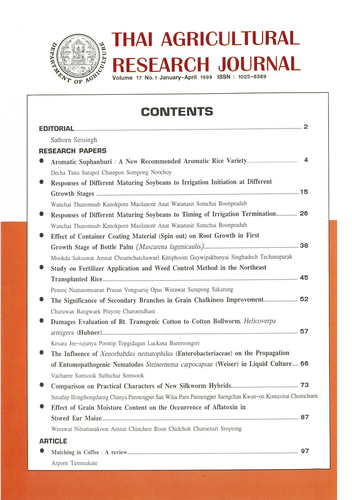Responses of different Maturing Soybeans to Irrigation Initiation at different Grwoth Stages
DOI:
https://doi.org/10.14456/thaidoa-agres.1999.2Keywords:
soybeans, irrigation initiation, growth stages, yield componentsAbstract
Irrigation frequency directily influence variable costs of soybean production. Reduction in the number of irrigation can be done by delaying irrigation during growth stages. The experiments were carried out in 2 consecutive year to investigate responses of 3 maturing soybean cultivars to irrigation throughout the season was 3-6 for 1995/96 experiment (Expt. I) and 4-7 for 1997 experiments (Expt. II). Total amounts of water applied throughout the season for Expt. I and II were 124-237 and 141-282 mm respectively, depending up on initiation of irrigation and cultivars used. Three soybean cultivars responded similarly to intiation of irrigation in both seasons. Leaf area index, leaf area duration and crop growth rate reduced significantly with delaying irrigation from V4 to R3. Full irrigation (F1) produced the highest yield (342 and 231 kg/rai for Expt I and II, respectively,) whereas initiation of irrigation at V4, R1 and R3 stages reduced yields around 12 - 17 . 26- 33 and 29-44 % respectively. Reduction in the number of pods/plant was the main factor causing a smaller yield of beginning irrigation at V4, R1 amd R3. Three soybean cultivars shpwed no significant differences on yield for Expt. I, whereas SJ. 5 gave 5 and 12% yield higher than Sukhothai 2 and Nakhonsawan 1 respectively in Expt. II. Nakhon Sawan 1 produced the greatest seed size, and SJ. 5 and Sukhothai 2 had the highest number of pods/plant and seeds/pod, respectively.
Downloads
Published
How to Cite
Issue
Section
License

This work is licensed under a Creative Commons Attribution-NonCommercial-NoDerivatives 4.0 International License.
Thai Agricultural Research Journal



